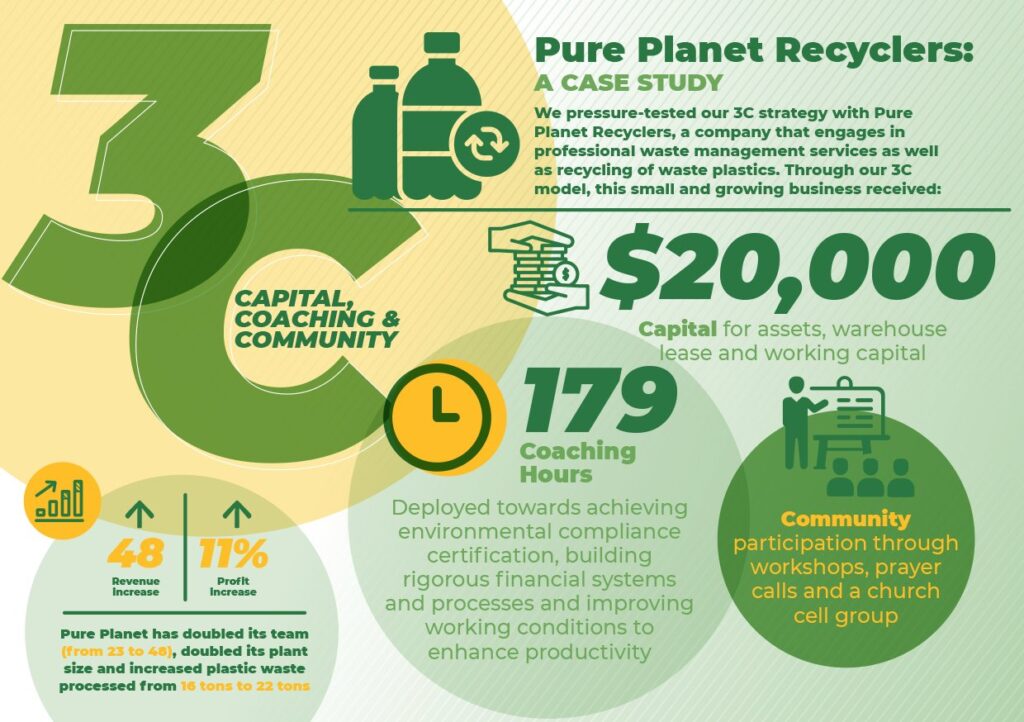In closing the strategic planning process, and envisioning the future, the team at endPoverty undertook deep reflection and stock-taking of decades of collective work. We juxtapose this with projections for the future, questioning deeply how the experience, data and our spiritual convictions inform the future of poverty alleviation. This birthed our new strategy for 2023 – 2027, the impact of which will transform 70,000 lives through job creation.

Reflecting on the Journey
The work of alleviating poverty is a long-running concerted mission that joins communities, donors, governments, churches, not-for-profit organizations and, most recently, the capitalist world of private enterprise.
Although up close it resembles a Sisyphean task, the work is reaping dividends in a manner of speaking. The April 2022 update from the World Bank reports that the global poverty rate (at the US$1.90 poverty line) in 2018 is 8.6 percent, down from 9.1 in 2017, equivalent to a decline by 28 million poor people between the two years. This revises previously published estimates, with newly available survey data and several changes to the underlying data.
In addition to expanded surveys and better data, interventions have evolved with the insight of lessons learned about what works, why it works and how to make it sustainable. The evolution saw poverty interventions shift from “a handout to a hand-up” driven by the core lesson that leveraging charitable resources to empower vulnerable communities with vocational skills and resources to generate incomes and breaks the cycle of dependency and restores human dignity.
This was characterized by activities that were often top-down, informed by donor priorities. This led to another significant shift – understanding what vulnerable communities needed, what dignity meant to them and how their aspirations could be supported. The epiphany emergent from this era of learning was that vulnerable communities desired access to the same opportunities that their more privileged counterparts enjoyed. They aspired to gainful employment, to entrepreneurship and to the ability to lift themselves, their households, and their communities out of poverty. Above all, they desired the empowerment to organize themselves along the lines of their perceived like-mindedness rather than be organized by donor priorities. This birthed the micro-business era.
Philanthropic giving in the micro business era is characterized by small loans and grants disbursed to individuals to equip them to earn an income out of a vocational skill. No effort is wasted, and a very important lesson here is that micro-business is a vital stepping-stone to scalable business.
Gearing for the future
Sustainable poverty intervention is anchored in creating and supporting small businesses that have the foundational building blocks to grow and scale, ultimately creating jobs and supporting communities. At endPoverty, with 37 years’ experience during which we have helped build more than 200,000 businesses in 37 countries, we launched our ‘Small and Growing Business’ (SGB) Program and defined our 3C model that has proven successful in a two-year pilot in Kenya. We have established this as our Flagship Program under the brand, Kua Ventures. ‘Kua’ is a Swahili word meaning “to grow” and the brand embodies our philosophy of partnering with local businesses for growth.
With a conviction grounded in faith, study, action, and demonstrable outcomes, we have designed our 2023 – 2027 strategy on this Program and theory of change. I am delighted to share our strategy that will bring us closer to our vision for a day when individuals, families and communities trapped in poverty become economically and spiritually empowered.
Our 3C strategy will deploy CAPITAL, COACHING and COMMUNITY to enable SGBs overcome barriers faced by SMEs in Kenya.
Capital
Small businesses in Kenya face significant barriers in accessing capital. The cost of credit is much higher for them, deliberately designed to mitigate risk of financing them compared to larger firms that have a steady flow of income or bigger financial muscle. This, essentially, renders financing inaccessible to them. In addition, access to institutional credit often requires collateral like land titles, which young founders may not have access to.
We offer affordable and blended capital to unlock social enterprises’ ability to grow and generate more impact in the community. Through Kua Ventures, endPoverty invests capital directly into faith driven SGBs with financial returns reinvested in the portfolio.
Coaching
Governance, compliance with industry and regulatory standards and strategic business management are limiting factors to sustainability of small businesses and has, in fact, been singled out as a key reason why many small businesses fail within the first five years.
We offer entrepreneur-led, practical mentorship to coach entrepreneurs in crucial business decision-making to grow their enterprises and create a larger impact. Devoted to adding value to the social enterprises, we allocate sector-specific mentors to coach each enterprise and draw from a pool of skills-specific technical experts.
Community
Leading Kenyan entrepreneurs that have successfully scaled their businesses in the region cite community of shared values as an important factor to their success. Beyond technical mentorship, they have benefited from safe spaces with entrepreneurs that are further ahead on their journeys, where they can be vulnerable, draw encouragement when on the cusp of defeat and be accountable.
We offer a safe environment to share ideas and discuss daily challenges faced by faith-driven entrepreneurs. We create an environment of accountability and encouragement on how to be Christ-like at work. Kua Ventures organizes workshops led by industry experts where entrepreneurs can discuss their struggles and achievements as faith-driven entrepreneurs.
What affirms our conviction in our strategy?
In 37 years of helping and supporting small businesses we have learned that small and growing businesses – those that have potential to scale – are businesses that have survived at least three years and emerged from the early start-up (micro-business) phase. In shifting our focus from micro-business, we are acting on the recognition that the micro-business landscape is well-supported with a blend of commercial micro-lending products and small business grant funding access through not-for-profits.
The make-or-break threshold is when a business has survived the first three years, is creating quality jobs and is too big to qualify for microfinance, yet too small and unequipped to attract commercial lending or venture capital. We position endPoverty at this threshold, hence the criteria by which we identify our SGBs.
Proof of concept We pressure-tested our 3C strategy with Pure Planet Recyclers, a company that engages in professional waste management services as well as recycling of waste plastics.

The results speak for themselves. Pure Planet has doubled its team (from 23 to 48), doubled its plant size and increased plastic waste processed from 16 tons to 22 tons, increased its revenue and profit by 41% and 11%, respectively.
Why Kenya?
The world’s youth is its greatest asset, looking into the future of sustainable economic growth and transformation. The spotlight is on Africa because according to the African Development Bank, the continent’s population of 1.2 billion is projected to more than double by 2050, to represent one-fourth of the world’s population. Africa will remain the world’s youngest region, with a median age of 25 (presently 19.5).
Against this backdrop, it becomes plain as day that Africa’s young growing working-age population will drive the continent’s economic transformation – provided it is properly harnessed to do so! And therein lies the present challenge: youth unemployment and underemployment in Africa is a burning platform.
Each year, approximately 11 million youth enter a job market that creates only three million formal jobs annually. The lack of paying jobs pushes youth into the informal sector, where jobs are typically less stable and have lower wages and leaves many more unemployed. However, youth turning to the informal sector to seek or create their own employment is a strong indicator that the pipeline to Africa’s economic transformation begins in the informal sector.
At endPoverty, our strategic focus is on the East and Central African region, which has consistently been cited as the fastest growing region in Africa, and indeed the world. Average GDP growth rates have averaged 5% over the last decade, with Rwanda leading at 7.3%, Tanzania at 7%, Kenya at 5.8%, and Uganda at 5%.
We believe that Faith Driven Kenyan businesses will enable solutions that are both replicable and scalable across the region because the country is a regional leader and strategically situated as a gateway to East and Central Africa. Kenya’s vibrant entrepreneurial landscape, dubbed the Silicon Savannah, includes many Faith-Driven Accelerators, Incubators and Business Schools collaborating to equip small businesses for growth.
Kenya’s Micro, Small and Medium Enterprises (MSMEs) contribute approximately 40% of the GDP with the majority falling in the informal sector and are projected to contribute 50% of the country’s GDP growth in the next three years. Add to this the fact that 80% of new job creation is within the MSME sector and it is a fact that Kenya’s economic future is vested in growing and sustaining small and medium-sized businesses.
The Vision
Informed by data and evidence, we have set ourselves the stretch target to grow 68 businesses, creating 6,000 jobs and transforming 70,000 lives by 2027.
Donate now and help us in our mission to endPoverty.
